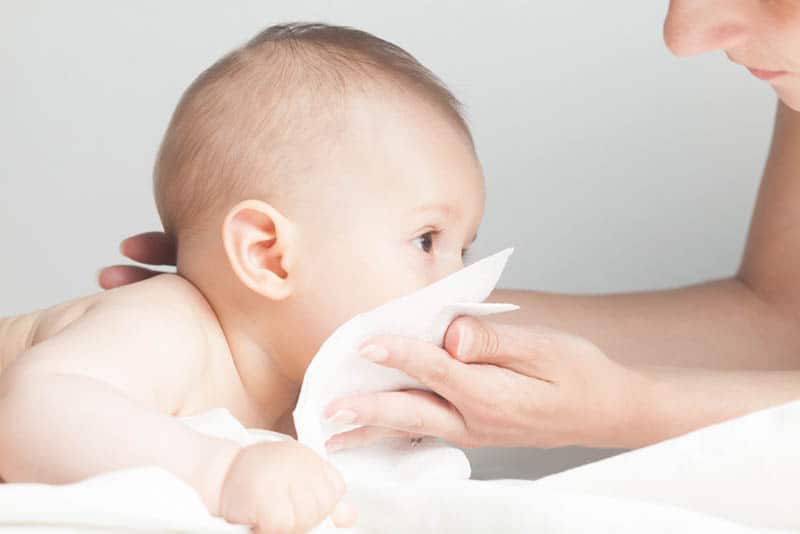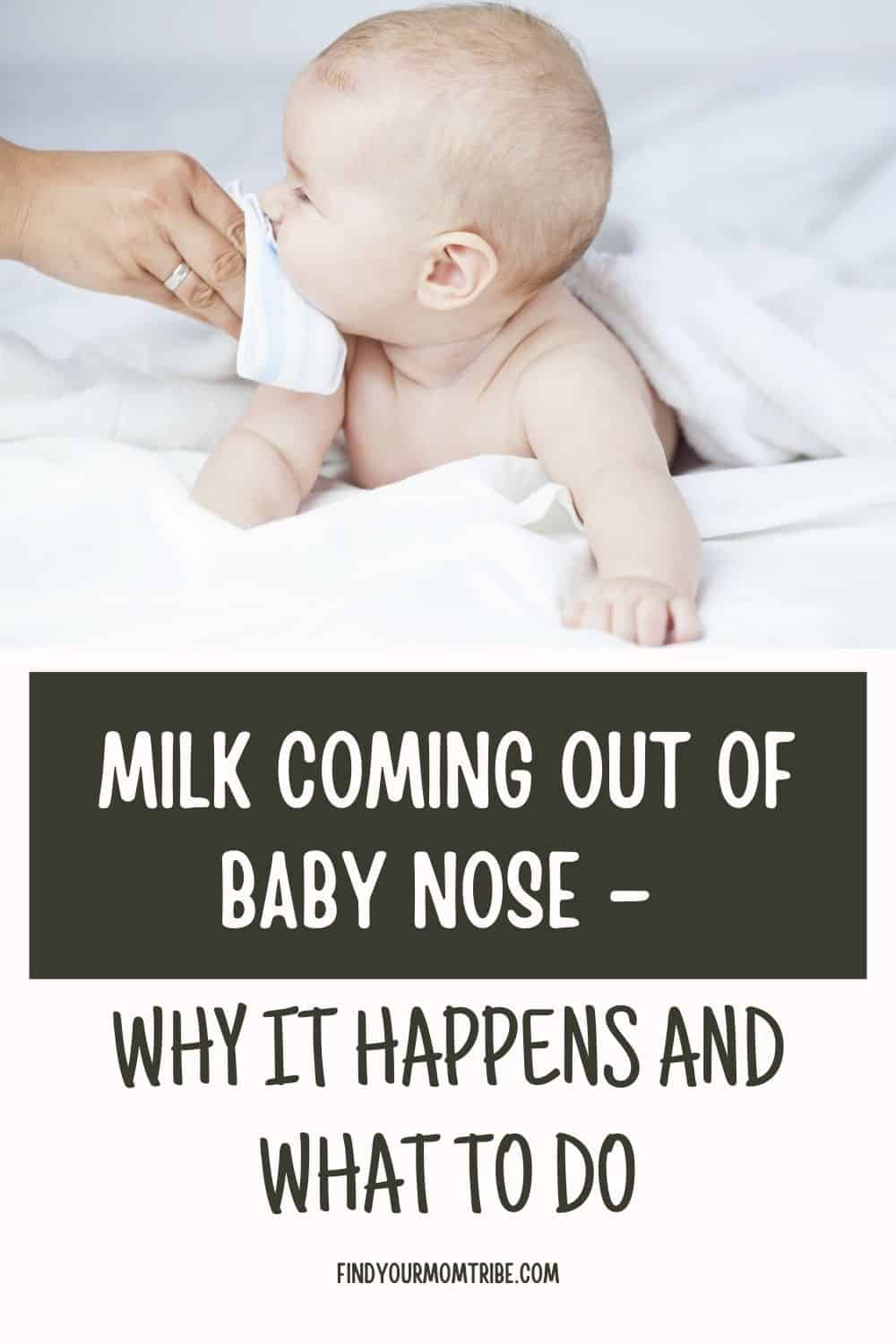We all know the timeless classic of laughing so hard that milk comes out of our noses, but does the same fun apply when we see milk coming out of a baby’s nose?
When they see milk coming out of baby’s nose, most new parents end up panicking. There’s no need to worry, though, as it’s perfectly normal in most cases.
It usually happens because your baby either gets distracted or a bit too greedy and overfeeds.
If he overfeeds, the milk comes back up his little throat and out one of two ways. Sometimes that way ends up being the nose.
It’s the equivalent of spitting up, though it only happens for the first 12-18 months of a baby’s life.
During that time, the child’s digestive system is still developing and isn’t as advanced as ours so it can’t really deal with large amounts of food.
Because of this, your child will often end up in this state while breastfeeding or bottle-feeding for a variety of reasons, but none of them are all that dangerous, with only a few rare conditions possibly leading to some cause for alarm.
So, what are these and how can you help minimize the chances of your baby’s nose turning into a breast milk or formula fountain?
Read on to find out.
What Does Milk Coming Out Of Baby Nose Mean?

This phenomenon is really just another form of spit-up, an infantile variant of reflux that happens due to a variety of reasons.
Your child gets distracted
One of the most common reasons tends to be the child getting distracted by something else in their vicinity, whether it’s the TV, you not paying attention to them, and/or having a conversation on the side, etc.
This leads to the child’s already limited attention span overflowing so he almost entirely forgets what he was trying to do before, which was to regulate the balance of sucking and swallowing.
This often leads to them getting ahead of themselves and swallowing a bit too much, which then leads to spit-up occurring due to them choking on the excess content their little esophagus can’t handle.
Our little ones can be really greedy, especially when they’re distracted, so make sure to pay attention to your baby to minimize the chances of him overfeeding.
Breast-related issues
Sometimes the cause could be something you simply can’t control but can treat, like breast engorgement or an imbalance of hindmilk and foremilk.
As you can see, it’s a very similar process to regular spit-up, but when your child is still a newborn baby whether the contents of the baby’s stomach come out through the baby’s mouth or nose is more or less a coin flip.
Swallowing air
The other common reason for this is your little one swallowing a lot of air while you breastfeed him.
This can be due to the child being extremely hungry, which will cause him to start eating greedily and not regulating his breathing with his eating, which in turn leads to him swallowing air.

A bad latch
A bad latch can also be the potential cause of this. If your child’s lips are loose and not suctioned around your nipple, make sure to correct his position to help prevent air bubbles from forming.
Why is swallowing air so bad? Well, it gets trapped between gulps and it won’t stay in that little bubble forever.
Once it pops, it’ll likely lead to a burp that’ll be followed up with a bit of spit-up out the baby’s nose or mouth.
An underdeveloped stomach valve
The next culprit can be an underdeveloped stomach valve in the lower esophagus, a sphincter that tightens up in order to close the stomach off from the esophagus and start digesting the food.
However, because it hasn’t fully developed yet, this will likely be a major cause for a very specific sort of spit-up in babies called infantile reflux or acid reflux, or in more serious cases, GERD (gastroesophageal reflux disease).
This particular problem can be really upsetting for kids, because on top of the baby spitting up it also sends some of that stomach acid up the esophagus which will irritate it severely, leading to a very upset and fussy child.
Most of these should subside by the time your child reaches his first birthday or up to 18 months of age, but if they don’t you might need to call for some proper medical attention, but that is very rare.

Having a cleft palate
Another rare potential cause could be due to your child having a cleft palate. Mind you this is an extremely rare occurrence, but a very possible one.
Having a cleft palate means that you have a hole in the roof of your mouth, which will lead to a much higher chance of breast milk coming out of the baby’s nose after a feed.
This is due to the difference in facial structure and is likely to cause mucus to clog up the nasal passages.
Sneezing or coughing
The final reason a baby’s spit up is coming out of his nose could be as an aftereffect of coughing or sneezing.
This is kind of linked to the underdeveloped lower esophageal sphincter, especially in its weakened state, where almost any abrupt contraction of the child’s muscles can lead to it loosening.
This means just a few odd sneezes here and there could be enough to send spit up or even vomit shooting up the esophagus and through the baby’s nose or mouth like a projectile.
None of these are really a cause for worry, though, as even healthy children can and will have this happen to them several times throughout the day if they’re not careful.
Even a healthy child is bound to resort to gulping or swallowing air here and there as a result of a bad nipple latch, regardless of whether he’s a bottle-fed or breastfed baby.
All this can be remedied very easily simply by burping your child after every meal or when he feels uneasy.
It’ll help sort those gas bubbles out early and somewhat regulate the excess liquid in his system.
This is why burping your child is an important lesson that first-time parents should learn, as it’ll help save a lot of time and patience when raising their child.
What’s The Difference Between Spitting Up And Vomiting?

When most people think of spitting up, they often think it’s the same as vomiting.
While the start and end points are the same, the two vary significantly in volume, intensity, and level of discomfort.
Spit-up is often caused by something completely harmless, like having your child swallow air or drink a bit too much breast milk or formula.
It’s likely to happen quickly after the trigger that caused it.
It won’t come out in large amounts, but more like a dribble of drool, maybe a bit more.
It’ll come out as either oral or nasal regurgitation in young children, before eventually becoming exclusively oral later down the line.
Eventually, it fades away completely.
Vomiting, however, is a lot more explosive and uncomfortable.
It’s something that’ll cause the entire body to react violently, with all the muscles contracting to expel the stomach contents.
One of the more common causes of vomiting is a stomach infection caused by a virus of some sort or eating spoiled or rotten food.
Vomiting can also be triggered by intestinal blockage.
Motion sickness is also a known cause of vomiting, especially with people who have a damaged or infected middle ear.
However, while vomiting is often dangerous if it happens too often, you should be aware that it’s a sign of your body trying to fight something bad.
Should it happen too often, make sure to contact your child’s pediatrician, your family doctor, or any other qualified healthcare provider to determine if the cause is something dangerous that requires professional treatment.
The medical advice from a pediatric practitioner is something that should always be followed.
How To Reduce Milk Coming Out Of Baby’s Nose?

Spit-ups are bound to happen with children no matter how careful you are.
Believe me when I say that I speak from experience!
I tried to be as careful as possible with my baby, and he still ended up swallowing a bit too much, or his esophageal sphincter would give way, allowing the milk to regurgitate itself back up.
You can’t escape it, but you can help minimize it through very simple methods.
Here’s a quick overview:
1. Have a proper schedule for your feeding sessions
2. Don’t overfeed your child
3. Regulate the silicone nipple on the baby bottle
4. Minimize distraction during feeds
5. Make sure to burp him after every feed
6. Feed your child in an upright position
7. Avoid tight clothing/diapers around the abdomen
8. Avoid exercise for at least an hour after eating
9. Check if the formula is to blame
One simple thing you can start doing with minimal investment is regulate your feeds.
When I say this, I mean keeping breastfeeding or bottle-feeding periods consistent every day.

Make sure they always happen in intervals as equal as possible, and that they occur at the same time, that way your kiddo won’t get too hungry or greedy because his food won’t be late. Always give him equal doses too.
If your child ends up feeling full sooner, don’t insist on feeding him more, that’s a recipe for disaster.
If your child is bottle-fed, the same applies, but there’s one additional tidbit that’ll be of great help, and that’s to make sure the hole on the silicone nipple isn’t too big, this will prevent a potential gush of milk from going into your little one’s mouth.
You can even get a slow flow nipple if you need to.
In order to avoid taking your child’s mind away from feeding, make sure to feed him in a quiet room, preferably with low lighting.
It’s an added bonus if you have a humidifier and/or a white noise maker in the room to help calm the child and keep him focused on feeding.
Another thing you might want to try is to burp after every feed.
This helps settle the food in the stomach much easier and helps eliminate any excess gas your little bundle of joy might have swallowed during the feed.
You might get a little bit of spit up on the burp cloth, but it won’t be milk coming out of the baby’s nose, that’s for sure.
Once that’s done, set him down in an upright position.
Keeping your baby upright for about 15-30 minutes after every feed helps keep the food down and lets it settle better than if he is lying on his back.

While we all like putting cute, form-fitting onesies on our kids, it’s a great idea to make sure the clothes he’s wearing aren’t too tight, especially around the abdominal area.
This could simulate a contraction of the child’s abdominal muscles, especially given his squishier frame, and cause an involuntary reflex that could lead to him spitting up, or in rarer cases, even vomiting.
If you’re feeding your baby close to his bedtime, make sure he falls asleep on his back.
This way you avoid putting pressure on his stomach, which might lead to a few accidents, similarly to how tight clothing affects him.
Save tummy time and other muscle exercises for at least an hour after he eats.
This way you won’t risk there being a little stream from his mouth because you will have allowed the food to settle for long enough.
Finally, if you’re feeding your child formula and this issue keeps popping up, it might be worth inspecting the formula itself for any ingredients that might cause irritation to your child’s stomach.
If you suspect something might be off, contact your family doctor and schedule an appointment so they can safely get to the root of the problem.
When To Worry

While I did say that spitting up is generally not a sign of anything serious, there are some rare cases where certain factors showing up along with the spit-up are a sign of something worse.
Most of these will be obvious, but they’re worth noting anyway.
Some of the most worrisome signs of trouble are:
• Traces of blood in the spit-up
• It comes out in a mucus-like texture, often as green or yellow spit-up (a sign of a stomach infection)
• Your baby is fussier/more colicky than usual
• Your child is losing weight
• Your baby appears to have some difficulties breathing or his face starts changing color
• His poop has changed texture, color, or has traces of blood/mucus(stomach lining) in it
Most of these are going to be immediate causes for alarm, and the most common causes are intestinal blockages or stomach infections from a virus or something bad he might’ve eaten.

The other likely cause is some sort of heavy intolerance/allergy due to an underdeveloped digestive system.
This will pass with time, but you still need to be careful so as to avoid causing a major problem down the line. Be careful what you’re feeding your baby.
Seeing blood is especially worrisome as it’s a sign of internal bleeding (hemorrhaging) and will require an immediate visit to the ER to see exactly what caused it.
The other big problem is with difficulty breathing and a color shift in his face, as that’s a clear sign of choking.
While this is only going to happen if the food (in this case, the milk) ends up getting into the child’s windpipe, (trachea) which is extremely rare and only occurs if his reflex for swallowing food is still undeveloped, it’s still a major cause for concern.
This is primarily due to the fact that anything that isn’t air traveling down the windpipe can cause your child’s airways to clog up, and in the worst-case scenario, end up causing pneumonia among other things, which hits anyone hard, especially children.
In this case, you’ll want to call 911 and get immediate medical attention.
In Conclusion

Milk coming out of a baby’s nose isn’t the worst thing in the world, in fact, it’s quite harmless in most cases.
It’s something that even the healthiest of children go through on a daily basis.
More often than not, it’s caused by the odd gas bubble that forms in the esophagus or inside the stomach due to your little bundle of joy swallowing a bit of air.
When that pops, it sends some of that milk right back out through either the nose or the mouth in the form of spitting up.
The other common reason is a bad latch or him getting too much milk either through an issue with the balance of milk in your breasts, an engorged breast, overfeeding, or due to him being distracted.
Luckily, all of these can be solved by simply eliminating distractions, feeding your child in a quieter environment with nothing to distract him, and holding him in an upright position to allow the milk to make its way down to the stomach easier.
Don’t forget to burp him after every meal either, it’ll help clear out any of those stray gas bubbles that might’ve snuck their way in by accident.
However, be on the lookout for signs of a more serious issue.
If the contents of the child’s stomach come out with mucus, a shifted color, or as acid reflux that burns the child’s throat, make sure to pay the doctor a visit. It might be a sign of a potentially more serious problem.
It’s also worth noting that if it ever turns into vomit, it might be a good sign that your little one has contracted some sort of stomach infection.
Finally, no matter what the case is, always make sure to listen to your doctor or your child’s pediatrician when it comes to any medical matter.
They’re the ones who know what’s best for your child and will give the most accurate medical advice as they’re able to better diagnose the potential symptoms in person.
Nobody on the internet can do better than that, and articles like these should only be taken as guidelines or quick references as to what should be done, not as a replacement for your local medical professional.
I do hope they end up helping you out in the long run and that they’re keeping you informed, mamma.
Until next time.
READ NEXT: Why Your Baby Spits Up Clear Liquid And How To Prevent It
Like this post? Please share or pin it for later. You can also stay in the loop and follow us on Facebook, Instagram or Pinterest.

We love honesty! Find Your Mom Tribe is an Amazon Associate and we earn from qualifying purchases through affiliate links at no extra cost to you. Please see our full Amazon Affiliate disclosure for more information.

